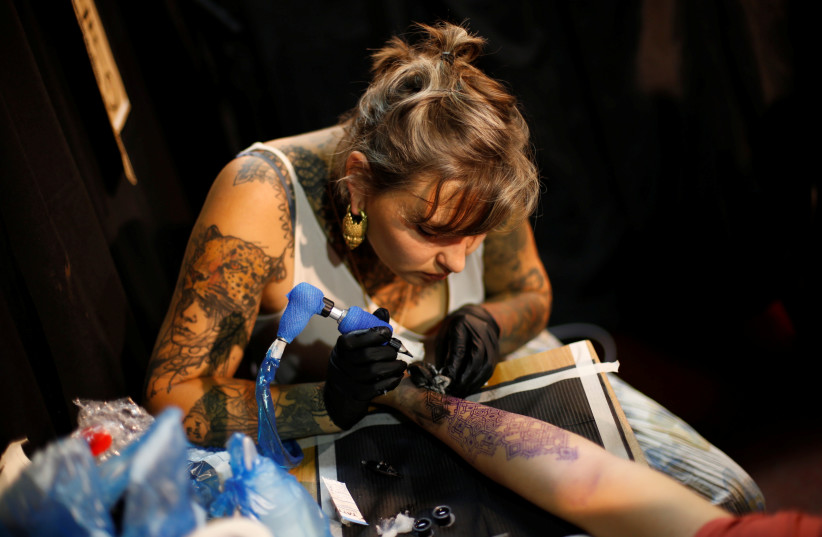Growing up in Manchester in the 1980s, tattoos were a definite no-no, as far as I was concerned. They weren’t for decent folk and certainly not for nice Jewish girls.
It was also drummed into me that tattoos were strictly off limits, as they are forbidden in Halacha (Jewish law).
Furthermore, I, like many others, labored under the misconception that jews who had a tattoo couldn’t be buried in a jewish cemetery. Such markings would either have to be removed or scraped off before burial. This, of course, is utter nonsense, as Rabbi Dan Lieberman confirmed, “It’s the type of thing which mothers tell their children to stop them getting tattoos, but it actually has no basis in Halacha,” he said. He did go on to add that tattoos themselves are strictly forbidden in Jewish law, just in case anyone is in any doubt.
Over the last decade or so, tattoos have lost their taboo, thus becoming more mainstream in Western culture and acceptable across all sections of society. No longer are they associated with sailors and criminals, as they were when I was growing up in Manchester, but with people of all ages and from all walks of life – even an extended member of the British Royal family, Lady Amelia Windsor has been inked and she isn’t afraid to show off her tattoos.
In spite of this, some Jews will always have a difficult relationship with inking. For the more observant, the fact that tattoos are forbidden in Jewish law ends any discussion on the matter. The Torah is unequivocal on the subject, “You shall not etch a tattoo on yourselves.” (Leviticus 19:28)

For the less observant Jew, however, as tattoos have become more popular in the last decade or so, many have been drawn to this fascinating art form.
Accordingly, secular Israelis who often follow Western culture and trends have embraced tattoos to such an extent, it is safe to say, that inking is now part of Israeli culture.
However, for many Jews both here in Israel and across the globe, tattoos still have sinister connotations. They are a reminder of our dark past, namely the shoah. The idea of having a tattoo is totally abhorrent for them, given the fact that so many of our people were forcibly inked with an identification number during this horrific period in our history.
Some survivors still bear those numbers on their arms today, reminding us of the horrors of the past. To voluntarily subject oneself to inking, some would say is both distasteful and disrespectful to the memory of the victims and survivors.
Interestingly, others disagree, even the children of survivors in some cases.
Zimra Vigoda, who was born in Hungary and has lived in Israel for over half her life says that “tattoos were taboo in the household I was raised in – Holocaust connotations and Jews just don’t. My kids have tattoos – Amit in particular likes them. I am simultaneously weirded out because the prohibition is so ingrained in my mind and happy that finally my children are (in many ways) free from the curse of the inter-generational trauma of (not only) the Holocaust.”
Israelis’ love affair with inking, some believe, stems from the fact that we are no longer in a minority group and as such, we have more confidence in our own Jewish identity, thus giving us more freedom to experiment. Tattoos are simply an extension of that and have been embraced accordingly.
Many see tattoos as a way to express themselves and their dedication to loved ones. Some, for example, have the names of their children and partners tattooed on their bodies, while others have a religious symbol, such as a Magen David, as an outward display of their faith.
As one woman said, her tattoos are a way to express her Jewishness and her freedom.
A tattoo can mark an occasion in a person’s life in a way that nothing else can, staying with a person until the end of their days.
That said, it is still obvious to me when I visit Manchester that the jewish community there hasn’t embraced the art of the ink as fervently as their Israeli cousins, or at all, frankly. Even today, very few British Jews have a tattoo and those who do are seen as edgy, even though their design is likely to be discreetly hidden. The same can be said for the US – as one person said, he “wouldn’t be welcome in many Jewish spaces with visible tattoos” whereas here in Israel, his tattoos don’t present any problems at all for him.
Perhaps, it is because Jews in the diaspora feel more restricted by convention or perhaps it’s because it’s hard for them (and people like me who grew up there) to throw off the taboo of the tattoo, which was been instilled in us from an early age.
The weather may also be a factor. Many Israelis spend a lot of the year in shorts and t-shirts, thus affording them ample time to display their body art, whereas Brits remain fully clothed most of the year, owing to the cold, rainy weather.
Whatever the reason, the Israeli love affair with the tattoo is just one of the many factors that makes Israel such a cool, free thinking, diverse, colorful, interesting and wonderful country.
It also serves to highlight the fact that here in Israel, we are no longer at the mercy of those conventional norms by which many in the Diaspora still feel bound.
The writer is a former lawyer from Manchester, England. She now lives in Netanya, where she spends most of her time writing and enjoying her new life in Israel.
